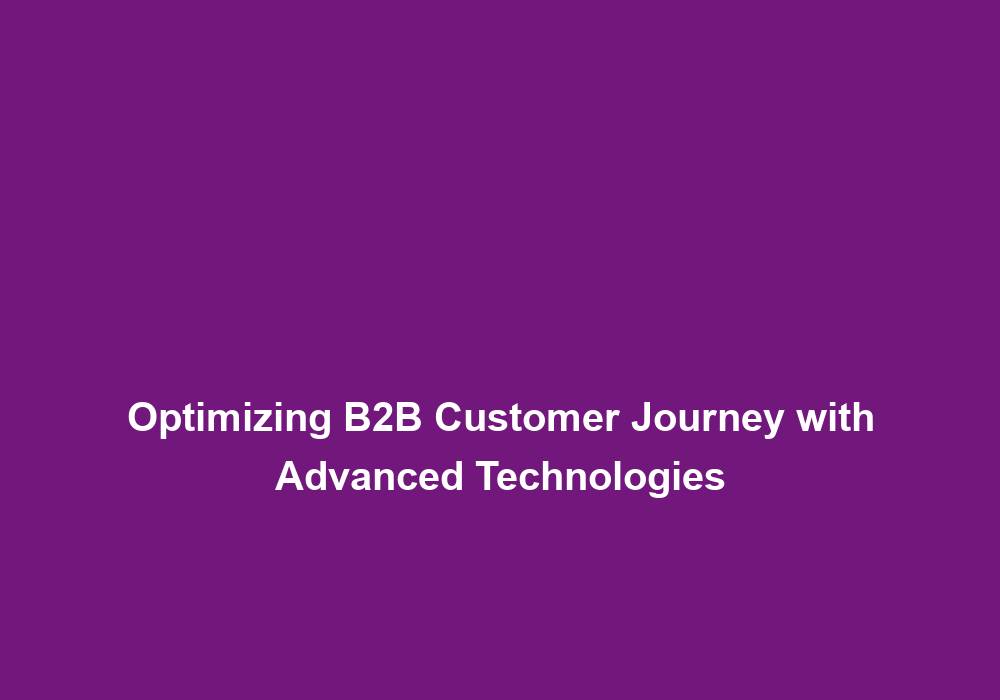In today’s digital age, businesses are constantly seeking innovative ways to enhance their B2B customer journey. The customer journey encompasses all the touchpoints and interactions that a customer goes through when engaging with a business, from the initial awareness stage to post-purchase support. With the emergence of advanced technologies, optimizing the B2B customer journey has become more attainable than ever before.
Understanding the B2B Customer Journey
Before diving into the various advanced technologies that can enhance the B2B customer journey, it is essential to have a comprehensive understanding of the journey itself. The B2B customer journey typically consists of the following stages:
- Awareness: At this stage, potential customers become aware of your brand and the solutions you offer. They might come across your website, social media presence, or other marketing channels.
During the awareness stage, it is crucial to provide informative and engaging content that educates potential customers about your brand and the value you can provide. This can be achieved through blog posts, social media posts, and educational videos that highlight your unique selling propositions and showcase your expertise. By utilizing advanced technologies, such as artificial intelligence (AI) and machine learning (ML), businesses can personalize content to cater to the specific needs and interests of each potential customer. AI-powered systems can analyze customer data and behavior patterns to deliver tailored content and recommendations, fostering customer engagement and enhancing the overall experience.
- Consideration: Once customers are aware of your brand, they move into the consideration stage. Here, they evaluate your offerings and compare them with competitors.
During the consideration stage, it is essential to provide comprehensive and detailed information about your products or services. This can be achieved through in-depth product descriptions, case studies, and comparison charts that highlight the unique features and benefits of your offerings. By leveraging AI and ML, businesses can utilize predictive analytics to analyze vast amounts of data and identify trends, preferences, and potential customer needs. These insights can then be used to optimize marketing strategies, personalize messaging, and enhance decision-making processes. Additionally, businesses can utilize chatbots and virtual assistants powered by AI to provide instant assistance, address customer queries, and offer personalized recommendations 24/7. This not only enhances customer satisfaction but also reduces response time and improves overall customer experience.
- Decision: In the decision stage, customers are ready to make a purchase. They analyze pricing, terms, and conditions before finalizing their decision.
During the decision stage, it is crucial to provide transparent pricing information, clear terms and conditions, and compelling offers. Businesses can utilize advanced technologies, such as customer relationship management (CRM) systems, to centralize customer data and gain a holistic view of each customer’s journey. This enables businesses to tailor their offerings to specific customer needs, provide personalized quotes or proposals, and address any concerns or objections that may arise. By automating workflows through CRM systems, businesses can streamline processes such as lead generation, follow-ups, and customer support, ensuring that no leads fall through the cracks and enabling efficient and timely support. Additionally, businesses can leverage analytics and reporting capabilities of CRM systems to track customer interactions across various touchpoints, such as email, phone, and social media. This data helps identify pain points, preferences, and areas for improvement, allowing businesses to make data-driven decisions and optimize the decision-making process.
- Retention: After making a purchase, it is crucial to retain customers. This stage involves providing excellent customer service, ensuring customer satisfaction, and promoting loyalty.
During the retention stage, businesses need to focus on delivering exceptional customer service and personalized support. Advanced technologies, such as marketing automation tools, can empower businesses to automate repetitive marketing tasks, nurture leads, and deliver personalized content. By segmenting the audience based on various criteria, businesses can tailor messaging and targeted marketing campaigns to specific customer segments. This personalization fosters deeper relationships, establishes credibility, and increases the likelihood of conversion. Additionally, marketing automation tools provide valuable insights into campaign performance, allowing businesses to track key metrics and make data-driven decisions. By analyzing the data, businesses can identify areas for improvement, refine their marketing strategies, and enhance the overall customer experience.
In addition to marketing automation, businesses can leverage customer experience platforms to deliver a seamless and personalized customer experience. These platforms integrate various technologies to engage with customers across multiple channels, such as websites, social media, mobile apps, and email. By providing an omnichannel experience, businesses ensure consistency and cohesion throughout the customer journey. Customer experience platforms leverage AI and ML to deliver real-time personalized experiences. By analyzing customer preferences and behavior, businesses can deliver tailored content, recommendations, and pricing options. Furthermore, by offering self-service options such as knowledge bases, community forums, and chatbots, businesses can provide immediate support to customers, reducing response times, enhancing customer satisfaction, and decreasing support costs.
In conclusion, optimizing the B2B customer journey with advanced technologies is a powerful strategy for businesses looking to stand out in today’s competitive marketplace. By leveraging AI and ML, CRM systems, marketing automation, and customer experience platforms, businesses can enhance personalization, streamline processes, and ultimately drive better customer outcomes. Embracing these advanced technologies will allow businesses to provide exceptional experiences that lead to increased customer loyalty, improved conversion rates, and long-term success.
